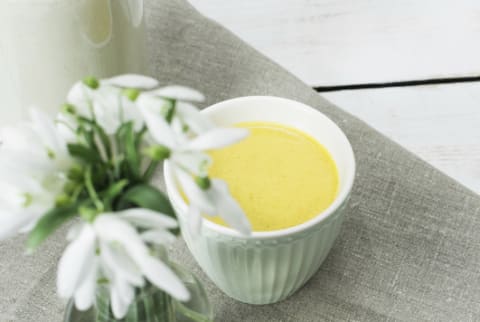Advertisement
The Healthy Nightcap You Need For Better Sleep


In this piece, Dr. Kulreet Chaudhary, a physician and author of The Prime, shares the benefits of golden milk and explains why she recommends making it part of your evening routine. If you're interested in learning more about Ayurveda for optimal health, check out her course: How to Use Ancient Ayurvedic Wisdom to Heal Your Gut & Achieve Long-Lasting Weight Loss.
In Ayurveda, dairy products have been used for millennia as a way to promote health. Yogurt and lassi are natural sources of live probiotic cultures, ghee is the preferred cooking oil, and milk is revered for its ability to promote ojas in the body.
In Sanskrit, ojas translates into vigor and is the basis for physical, mental, and spiritual health. Ojas is the pure and subtle substance that is the most refined byproduct of healthy digestion. It actually takes the body about a month to create ojas from a meal that you consume.
There are specific foods and beverages that prevent the formation of ojas, such as cheese, alcohol, and processed foods. Other foods actually promote the formation of ojas, including almonds, honey, rice, and milk. Of course, when referring to its ojas-promoting properties, I'm not talking about the homogenized, antibiotic-filled milk found in most grocery stores—but rather minimally processed milk coming from pasture-raised animals.
A popular ojas-promoting Ayurvedic drink that is now coming into vogue is milk with turmeric. I was first introduced to turmeric milk, or golden milk, the first time I went for panchakarma, a seasonal Ayurvedic purification treatment, at the age of 16. Following a day of massages and other Ayurvedic treatments, I was greeted in the evenings by a piping hot cup of golden milk.
It was the loveliest way to enter the dream world and end a day of detoxification. I felt warm, relaxed, invigorated and content like I was wrapped in a little golden cocoon.
Milk and honey, both key ingredients in golden milk, promote the production of ojas, and turmeric is a key medicinal tool in Ayurveda. Recently turmeric has gained the recognition of the scientific community for its potential for lowering cholesterol, reducing blood sugar in diabetics, relieving arthritis, supporting liver function, improving digestion, reducing menstrual cramps, and reducing inflammation in the colon. Its broad medicinal uses are likely due to its anti-inflammatory, antiseptic, and antioxidant qualities.
If you'd like to try out golden milk and its relaxing, healing properties, I recommend this simple recipe:
- Add ¼ tsp of turmeric powder to ¼ cup of water in a pot and heat until it becomes a paste—stirring occasionally to help dissolve the turmeric powder
- Add 1 cup milk (either use organic raw cow/goat milk, unhomogenized organic cow/goat milk, organic almond milk, or organic coconut milk) to the turmeric paste
- Add 1-2 tsp of either ghee, coconut oil, or almond oil to the milk mixture
- Add a pinch of either cardamom powder or cinnamon powder (optional)
- Add 1 tsp of honey once the milk has cooled enough to touch
There are also some golden milk powders available, such as from Gaia Herbs.
Once you’ve tried golden milk, you’ll be hooked on the way it settles your mind and body at the end of the day and invites your entire being to relax and let go of any worries as you drift off to sleep.
Related reads:∂